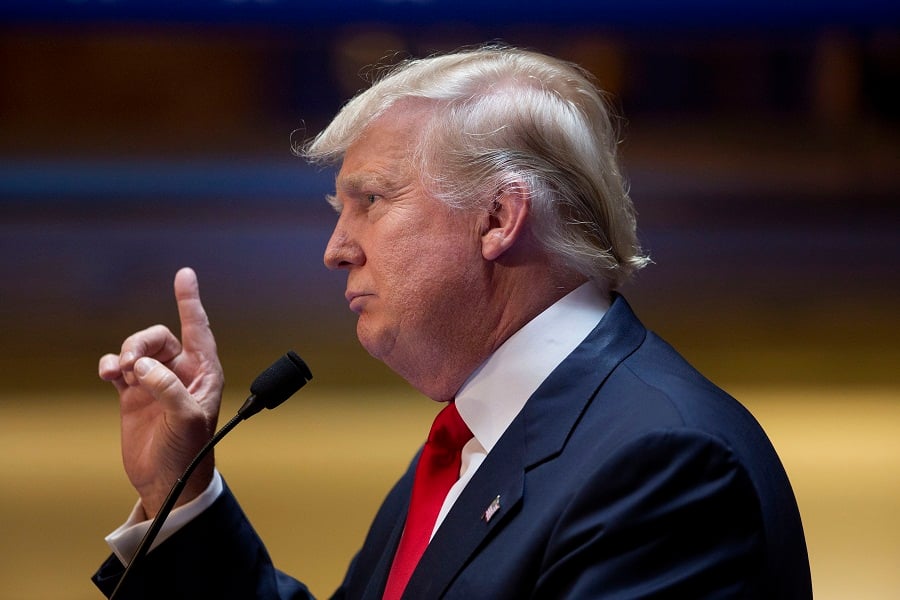According to Barry Ritholtz, whether we are in a bubble has yet to be determined, but Donald Trump is most certainly not the first to cry wolf.
"Remember the word 'bubble'? You heard it here first."
So said Donald Trump at a campaign event in Cedar Rapids, Iowa, on Saturday. As Bloomberg reported, he was speaking to a group of about 1,200 people, discussing the economy in between taking potshots at former Florida Governor Jeb Bush.
Whether we are in a bubble has yet to be determined, although I have been rather skeptical. Whether Donald Trump is the first to declare so is not at issue; he most certainly is not.
Watching for Bubbles
According to a chart indicating interest in the word "bubble" via Google Trends, it peaked in about March and April of 2009 — just as the market sell-off was hitting bottom. Those investors who were wary of U.S. equities because of their early 2009 bubble concerns missed a legendary rally, one in which indexes, such as the Standard & Poor's 500, recovered all of the losses from the financial crisis and then some, in a tripling from the lows to recent highs.
As you may recall, we have discussed this phenomenon many times during the past few years. Sometimes the bubble term is applied to the art market. Hedge-fund managers are sometimes guilty of carelessly using the term, as is the news media. Things aren't made any easier by varying definitions of the word. It got so bad after the crisis that I declared we had a bubble in bubbles.
Regardless, you have been hearing bubble calls repeatedly, increasingly and incorrigibly. What's so amusing is that the bubble cries peaked after the last bubble popped, when all such warnings were too late. We now are at the end of the sixth year of incorrect bubble calls. Just as generals fight the last war, it seems that every disappointed investor, armchair strategist and fallen analyst who missed the most obvious bubble in history has become an expert in spotting future bubbles.
Only they are not
Last week, I chided Sam Zell, the brilliant real estate investor, for his performance as an economic forecaster, which radically underperforms his record as a commercial real estate investor.
Also chastised were those forecasters who have been incorrectly calling for the Trump bubble itself to pop. It seems from the very minute the Trump phenomena bloomed to life, the naysayers have been predicting its imminent demise. That may (or may not) come to pass one day, but so far every prediction that the Trump bubble is about to burst has been the most incorrect political assessment of 2015.
It seems a mash-up of the two could now be the latest meme: Trump, the outsider finding political success by disproving the skeptics has become Trump, the billionaire, making an economic forecast. "We could be on a bubble and that bubble could crash and it's not going to be a pretty picture," said Trump. "The market has gone down big league the last couple of weeks. We could be in a big fat bubble and if that bubble crashes, it's a problem."
And how is Trump as an economic forecaster? Worse than Zell.
In 2013, Trump told Americans "to prepare for financial ruin." "Right now, frankly, the country isn't doing well," he said, adding, "Recession may be a nice word." The S&P 500 rose 30 percent that year.
Also in 2013, Trump warned of the fall of the dollar. The U.S. currency has since risen to the highest in almost 13 years.
Earlier, in 2011, Trump predicted that unemployment, then at about 9 percent, would rise once Obamacare went into effect. It has since fallen to 5 percent.
In a sense, these aren't really predictions; they're the stump speeches of a political candidate who is giving the crowd what it wants.
Perhaps one day Trump will be proven right in saying "You heard it here first." So many people have made so many bubble predictions that there is bound to be a chance that some of them will eventually be correct. But here's what's more likely: When a bubble does occur and pop — and that will happen someday — the people listening to Trump will be among the most surprised that it didn't happen the way he said it would.
Barry Ritholtz is a Bloomberg View columnist writing about finance, the economy and the business world. He is a professional money manager and started the Big Picture finance blog in 2003.







